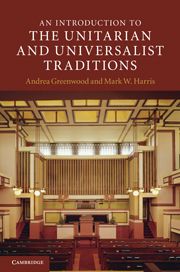Book contents
- Frontmatter
- Contents
- Acknowledgements
- A note on names
- Chapter 1 Introduction
- Chapter 2 Beginnings
- Chapter 3 Great Britain
- Chapter 4 From revelation to reason
- Chapter 5 From reason to intuition to freedom
- Chapter 6 A religion for one world
- Chapter 7 Congregational polity
- Chapter 8 Worship
- Chapter 9 Sources of faith
- Chapter 10 Science and ecology
- Chapter 11 Architecture, art, and music
- Chapter 12 Education and social justice
- Chapter 13 Current issues, new directions
- Selected bibliography
- Index
- References
Chapter 7 - Congregational polity
Published online by Cambridge University Press: 05 June 2012
- Frontmatter
- Contents
- Acknowledgements
- A note on names
- Chapter 1 Introduction
- Chapter 2 Beginnings
- Chapter 3 Great Britain
- Chapter 4 From revelation to reason
- Chapter 5 From reason to intuition to freedom
- Chapter 6 A religion for one world
- Chapter 7 Congregational polity
- Chapter 8 Worship
- Chapter 9 Sources of faith
- Chapter 10 Science and ecology
- Chapter 11 Architecture, art, and music
- Chapter 12 Education and social justice
- Chapter 13 Current issues, new directions
- Selected bibliography
- Index
- References
Summary
Unitarian and Universalist congregations all over the globe have mostly adopted some variation of congregational polity as their system of ecclesiastical organization. This method of governance reflects a faith in human abilities to not only “think for ourselves in matters of religion but to act for ourselves also,” so that no one, “whether of a Civil or Sacred character, [has] any authority to control us, unless it be by gentle methods of argument and persuasion.” This right to judge and act independently of any higher authority, as summarized by Jonathan Mayhew in 1749, reveals the central ecclesiastical affirmation of the free-thinking Unitarians.
Religious organizations that follow congregational polity are intended to be a reflection of the primitive Christian churches, which were small cells of independent believers. It was in Puritan New England where congregational polity reached its developmental zenith, and the strengths and weaknesses it revealed in that initial phase continue today. These include strong local and democratic involvement in each congregation, but also a fierce unwillingness to be organized in any authoritative ecclesiastical body. In recent decades, central organizations in many Unitarian and Universalist communities throughout the world have assumed more authority in attempts to provide common procedures, stronger leadership, and ultimately a common vision and mission for the faith, but for some, the system has become too bureaucratized, and there are new efforts to reinvigorate broader participation.
- Type
- Chapter
- Information
- An Introduction to the Unitarian and Universalist Traditions , pp. 127 - 146Publisher: Cambridge University PressPrint publication year: 2011

